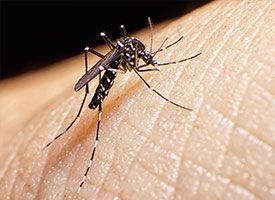By Paula Schlueter Ross
With the World Health Organization’s announcement that the Zika Virus is “spreading explosively” in Central and South America — and the fear that it can cause serious birth defects in unborn children — the Synod’s Office of International Mission (OIM) is acting quickly to protect its missionary families.
Missionaries who are pregnant and serving in the Latin America region may take advantage of an OIM offer to relocate with their families to another country or return to the United States for the duration of their pregnancy. If a woman is pregnant and preparing to deploy, she and her family may have their call relocated to a Zika-free country within the same region, or even be placed within another region that is Zika-free.
The offer was made in a Jan. 28 email from OIM Associate Executive Director Rev. Dr. Edward Grimenstein and Director of Missionary Services Christian Boehlke, and included referrals to three Centers for Disease Control and Prevention (CDC) websites with resources:
Active transmission of the virus — spread by the same mosquito as dengue fever — has been documented in more than 20 countries since last year, primarily in Central and South America, according to the CDC.
The Latin America region is most affected by the Zika Virus, and currently has 36 LCMS missionaries, 17 spouses and 42 children.
“We wanted to be proactive — to calm our missionaries and to let them know that they do have options immediately,” Grimenstein told Reporter. “This is totally up to the families. We are not at this point mandating that they come back, but we’re affording them every opportunity [to relocate] if they want to.”
Allowing missionaries to return to the United States to deliver their babies is nothing new, he noted, and more of a “standing practice for us.” But now those serving in Latin America will have the opportunity to come back to the States or live in another non-Zika country throughout their pregnancies.
According to the CDC, only about 1 in 5 people infected with the Zika Virus will get sick, with symptoms such as fever, rash, joint pain or conjunctivitis (red eyes) lasting for several days to a week. The illness is so mild, many people don’t even know they’ve been infected.
Grimenstein said WHO researchers were to meet today, Feb. 1, to look at the data and determine if more action is needed. The OIM, he added, will adjust its recommendations accordingly.
“Ultimately, people can rest assured that the Synod is watching out for our missionaries and will adapt, as necessary, to care for them.”
Posted Feb. 1, 2016
